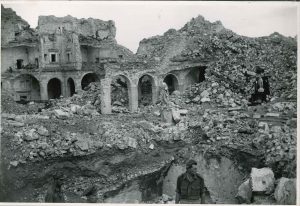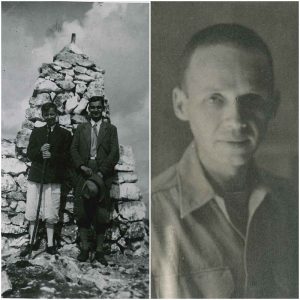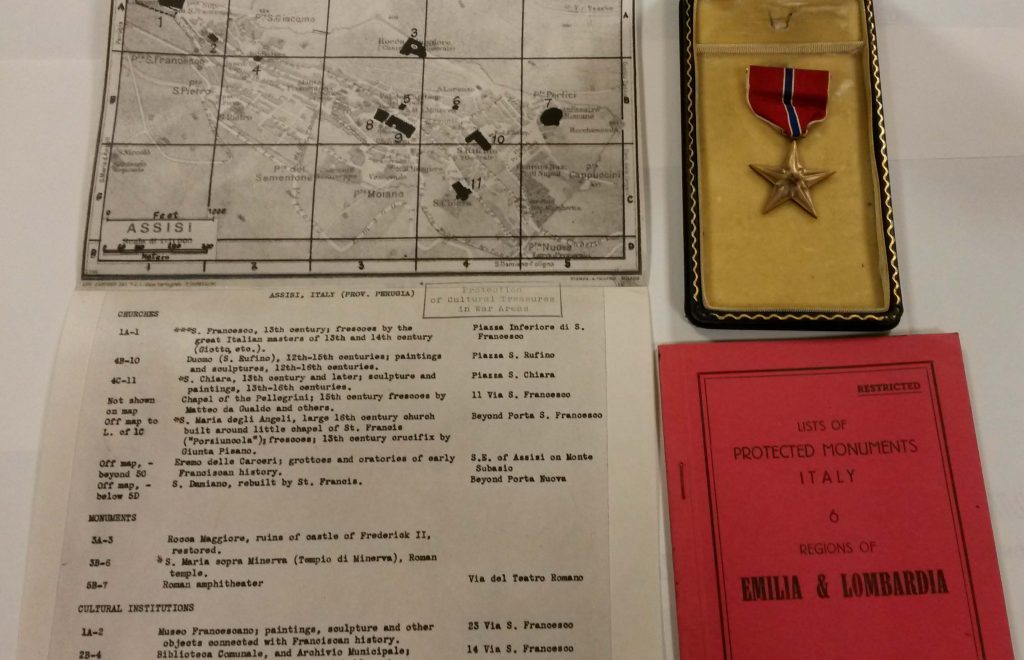
“It’s been a strange way to do my wartime service but somebody had to do it and, since…I wondered inside who will take care of the monuments and the objects of art, I’m afraid I rather asked for it and so it was not improperly myself who was chosen.” – Staff Sargeant Bernard M. Peebles to Colonel Ernest T. DeWald, 1945
The Museum, Fine Arts, and Archives (MFAA) Subcommittee, more popularly known as either the Monuments Men or Venus Fixers, was a program that focused on protecting and restoring cultural and historic sites and materials during the Second World War. Consisting of scholars of art, manuscripts, and architecture, the members of the MFAA often operated in active warzones across North Africa and Europe with limited resources. Not only did they work to assess the damages rendered to cultural sites and archives, but they worked to guarantee the survival of missing or pillaged art or manuscripts. Long-time Catholic University Professor of Greek and Latin (1948-1971) Bernard M. Peebles was one such Venus Fixer, serving in Italy from 1943-1945.

Peebles was born in Norfolk, Virginia on January 1, 1906. He received his Bachelors in Greek and Latin in 1926 from the University of Virginia, and his Masters and Doctorate at Harvard University in 1928 and 1940 respectively. During this time he was also a fellow at the American Academy in Rome from 1932-1934. While in Rome, he met and befriended a fellow scholar by the name of Wolfgang Hagemann. The two would later be on opposing sides of the war effort, with Hagemann engaged in art and translation work with Rommel’s armies in North Africa and Italy.
In the years prior to the war, Peebles’ teaching career blossomed as he taught at Harvard (1937-1939), Fordham University (1939-1941), and at St. John’s College in Annapolis (1941-1942). With the US entering WWII, Peebles enlisted in 1942, being assigned as a chief clerk for the MFAA . As one of the earliest members of the Program, he began his service in Sicily in the fall of 1943, where he was regarded as a “discoverer of manuscripts.”¹ As a report dated 20 January 1944 from Palermo, Sicily relates:
Visiting a hardware shop in Via Cassari, [Peebles] saw there some old MS. Documents loose on the counter and apparently about to be used as wrapping paper. Upon showing interest in the documents he was allowed to examine them and, afterwards, a larger number which apparently had been removed from the same bound volume and comprised some sheets of parchment, one with heading in gold. Upon offering to buy the smaller batch of documents, he was told that he have them as a gift… A second visit to the neighborhood to determine the precise location of the shop found it closed but revealed that several shops in the Via Argenteria were using similar old MSS. (along with other documents of more recent date) to wrap fish and other edibles.²

Among the documents recovered were those belonging to the Palermo state archives, including early eighteenth-century manuscripts from Philip V of Spain! Peebles continued to serve with the MFAA in Italy throughout the remainder of the war. In 1945, a request came in for him to transfer to Austria to assist the Monument Men there. Writing to Colonel DeWald, Director of the Italian MFAA, he expressed a desire to finish the job in Italy – a mission he referred to as “[his] baby” – and then return to his wife, child, and academic career in the United States. He was awarded this opportunity, along with the Bronze Star and British Empire medal.
Peebles returned to the US in 1945, and began teaching at Catholic University in 1948. He served with the Greek and Latin Department – including an eight-year stint as Chair (1962-1970) – until his retirement in 1971. A scholar with wide-ranging interests in Latin manuscripts, he is most well-known for his work on the Church Fathers and Patristic studies. Sadly, he died during a robbery attempt in 1976.
In addition to recording his long academic career, the papers of Bernard Peebles catalogs his experience of the Second World War, with Allied reports, maps, and propaganda material. It may be viewed here: https://findingaids.lib.catholic.edu/repositories/2/resources/275

¹laria Dagnini Brey The Venus Fixers: The Remarkable Story of the Allied Monuments Officers Who Saved Italy’s Art During World War II (New York: Picador, 2010), 71-72.
²Ibid.

Fascinating!